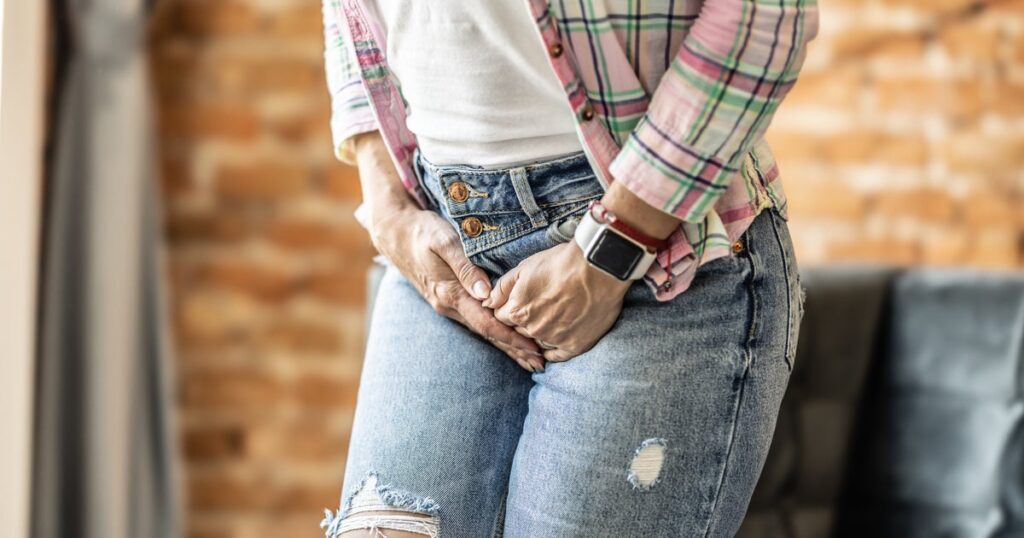Imagine it: you’re about to give a speech, have a job interview or undergo a medical procedure. You feel increasingly nervous — your palms are sweating, your heart’s beating a bit faster than usual, and, suddenly, you feel an intense urge to pee.
If you can relate, you’re in very good company. Research shows that needing to urinate is an incredibly common reaction to psychological and mental stress. It’s such a typical reaction, in fact, that Jenny Shields, a clinical health psychologist at Shields Psychology & Consulting, tells her patients that the bladder is stress’s megaphone — if you’re on edge, you’re bladder’s going to feel it. “As soon as the body interprets a situation as high‑stakes or uncertain, the bladder reflex can switch on,” Shields told HuffPost.
Here’s why your stress sends you rushing to the bathroom — and how to deal if you can’t stop thinking about peeing when you’re under pressure:
Why you feel like you have to pee when you’re nervous
According to Dr. Victor Nitti, an OB-GYN and professor of urology with the David Geffen School of Medicine at the University of California, Los Angeles, your body, specifically your adrenal glands, releases adrenaline when you’re nervous or anxious. This neurotransmitter prepares the body to react to stressful situations, giving you a burst of energy so you can either fight a potential threat or flee from it.
The urinary tract is packed with adrenaline receptors that play a role in regulating how your bladder contracts and empties itself. When adrenaline floods your body, those receptors in your urinary tract may become stimulated, Nitti explained, making you feel like you need to get to a toilet ASAP. When the bladder is more sensitive, it may involuntarily contract and leak a bit, he added.
Meanwhile, when you’re stressed out, blood shoots through the kidneys, causing them to manufacture urine faster, according to Shields. Your body also tends to clench up, including your pelvic floor, and all that squeezing can put pressure on the bladder, amplifying the urge to urinate. As Shields put it, adrenaline turns the tap on. “Put simply, stress pours more liquid into the bladder, turns up the fullness alarm, and squeezes the container all at once,” Shields said.
How to cope if you always have to urinate when you’re nervous
Fortunately, there are ways to tame your bladder if it tends to go haywire when you’re on edge. The first trick Shields recommends is a strategy called timed voiding.
To do this, simply pick an interval, such as every two hours, and go to the bathroom. Then, stretch that interval by 15 minutes each week until you can hold yourself for three to four hours. This essentially teaches your bladder that it doesn’t need to perpetually freak out and release itself when you’re nervous, Shields said.
While you’re at it, practice Kegel exercises when you’re feeling calm and anxious, Nitti advised. Per the Mayo Clinic, you simply want to squeeze your pelvic floor muscles to stop urination midstream. This will “help inhibit unwanted senses of urgency and unwanted bladder contractions,” he said.
Shield’s second piece of advice is to do urgency suppression drills. When you feel like you’ve gotta go, pause and take two slow, deep breaths. Follow that up with a quick pelvic floor squeeze and release (the squeeze, that is, not your pee). Then walk — don’t sprint! — to the bathroom. “Repeating this sequence teaches your brain that the signal is a request, not an emergency,” Shields said.
If you know you have a stressful event coming up — whether that be a job interview or potentially a heated conversation with your partner or boss — be intentional about how much fluid you’re drinking. Rather than chugging a bottle of water, sip it slowly throughout the day. “Smaller, even intake keeps the bladder from sudden overflows,” Shields said. People also find it helpful to avoid bladder irritants like caffeine, carbonated beverages, and alcohol, as these are known to inflame the bladder and ramp up urgency, Shields explained.
Lastly, if you try these tips and they don’t calm your nervous bladder, consider speaking to a certified therapist or your primary care physician. Various health conditions can trigger your bladder, including urinary tract infections, an overactive bladder, and prostate or pelvic floor issues. The sooner you get diagnosed, the earlier you can start treatment to tame your symptoms.
Having a nervous bladder might seem like a harmless issue, but planning your day around the nearest restroom is no fun. “If it’s starting to bother you, treat it like any other health issue,” says Shields. “It’s more common than you’d think.”
Read the full article here








